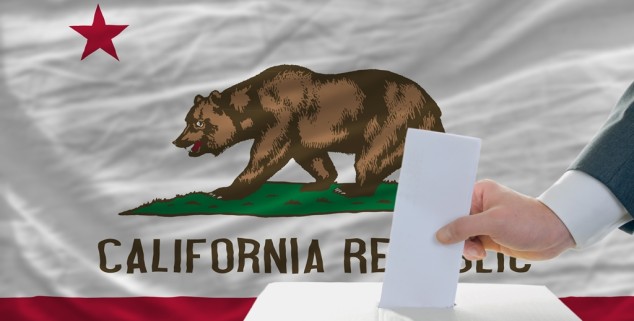News
Covered California targets voter registration
 Into the ballot box: A man votes in a California election. (Photo: Vepar5)
Into the ballot box: A man votes in a California election. (Photo: Vepar5)Voter registration, politics and health care: a volatile mix?
Millions of Californians who applied for coverage under the Affordable Care Act will be getting voter registration cards from Covered California, the state’s health insurance portal. It’s not clear how many actually will register.
Under the terms of a legal settlement with the American Civil Liberties Union, Covered California is sending out registration mailers to nearly four million people who sought health insurance. The mailings, which have already begun, are the first step in an ongoing voter registration effort that will include this year’s open enrollment period in the fall, when people choose new coverage plans or switch existing ones, and then continue into the future.
About 500,000 were sent out through February, although updated figures are not available, said Covered California spokeswoman Anne Gonzales. The mailing is supposed to be completed by May 15.
The partisan breakdown of the new registrations is not yet available from the secretary of state, although political strategists are waiting for the data. Through mid-April, the secretary of state’s office said it received 378 voter registration applications from Covered California applicants — apparently a tiny fraction of those that were mailed.
The League of Women Voters of California , one of several groups involved in the negotiations, said the registration effort is overdue.
“They really have to comply with their status as a voter registration agency,” said League spokeswoman Trudy Schafer. “We are very pleased that, yes, they decided to sign an agreement to comply.” Other groups included ACLU’s Voting Rights Project, Demos, and Project Vote.
The ACLU said Covered California was not following the federal National Voter Registration Act, which is intended to make it easier for people to register to vote. That 1993 law requires states to offer voter registration at offices that provide public services, such as the Department of Motor Vehicles. The linkage to DMVs prompted the law to be dubbed “Motor Voter,” although the law’s provisions extended the registration beyond DMVs.
In 2013, Covered California – a newly established agency serving the public under the federal health care reform law — did not engage in voter registration and voter outreach, the ACLU said. The lack of registration activity is what prompted the legal dispute.
“Although the enrollment period for Covered California began last October, voter registration has not yet been provided,” the ACLU said in a March 24 written statement.
Covered California “will incorporate required voter registration services into all processes by which a consumer engages with Covered California, including online, in person, by mail, and telephone transactions,” the ACLU noted, adding that the agreement calls for Covered California to immediately “do a remedial voter registration mailing to the nearly 4 million people who applied for health benefits since the launch of the Affordable Care Act on October 1, 2013, and it will continue these mailings until there is full compliance.”
The involvement of Covered California raised suspicions from some Republicans, who wondered whether the ultimate effect of the action will be to add more Democrats to the voter rolls. National conservative pundit Rush Limbaugh, for example, called it a “massive Democratic voter registration drive.”
But the partisan issue has not arisen, at least so far, although one registration form — pre-marked as Democrat — received attention in San Diego last month when it was mailed to a Republican couple.
Cynthia Bryant, the California GOP’s chief operating officer, said the San Diego incident initially raised questions, but that the mailing appeared to be a simple mistake. The government agency has the legal responsibility to be nonpartisan “and will have to sort it out,” she said. “It is what it is.”
“This is one in a series of conspiracy theories about how Democrats steal elections,” said Andrew Acosta, a Sacramento-based political strategist. “But it’s just a theory.”
The ACLU noted that the original law was approved with bipartisan support.
“There is no party affiliation to the National Voter Registration Act,” said Anna Castro, a spokeswoman for the ACLU in California. “The National Voting Registration Act is a nonpartisan act passed with wide bipartisan support,” she said.
Covered California thus far has enrolled nearly 3.3 million people for coverage — about 1.9 million through the expansion of the Medi-Cal program and about 1.39 million for the other health care coverage, Gonzales said, and several hundred thousand more have applied.
The mailing will go to those have obtained coverage already, as well as those who have applied online, by telephone or by paper mail.
The secretary of state, California’s chief elections officer, mails voter registration cards to Covered California which, through a third-party vendor, sends out a letter and voter registration card to people who applied for health coverage, the ACLU said. The cards are mailed back to the secretary of state which, in turn, sends it to the individual’s local registrar.
Recipients of the mailers are not required to respond, and many recipients may already be registered to vote.
“We are not checking with the secretary of state’s office or cross-referencing,” she added. “We are only the vehicle giving people the opportunity (to register), but we of course we have nothing to do with the actual registration … they (registrations) go directly to the secretary of state.”
Want to see more stories like this? Sign up for The Roundup, the free daily newsletter about California politics from the editors of Capitol Weekly. Stay up to date on the news you need to know.
Sign up below, then look for a confirmation email in your inbox.

[…] To read entire story, click here. […]
[…] Covered California targets voter registration […]